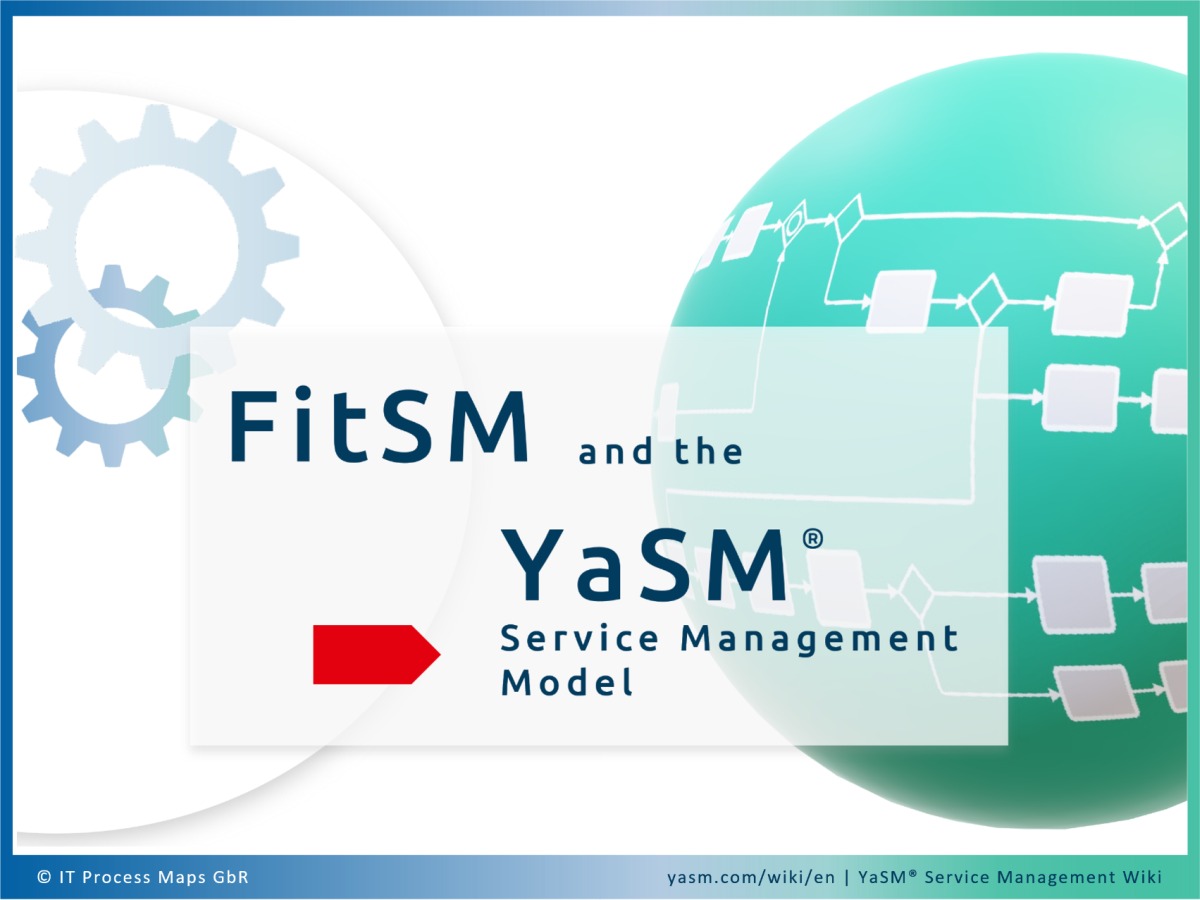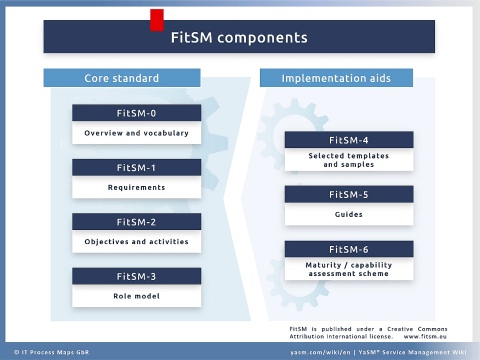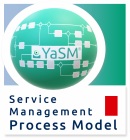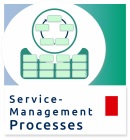FitSM and YaSM: Difference between revisions
Created page with "<itpmch><title>FitSM and YaSM | YaSM Service Management Wiki</title> <meta name="keywords" content="fitsm processes, fitsm templates, fitsm process model" /> <meta name="descr..." |
No edit summary |
||
| Line 32: | Line 32: | ||
<p> </p> | <p> </p> | ||
<html><div itemid="https://yasm.com/wiki/en/img/yasm-frameworks/fitsm/fitsm-process-templates-yasm.jpg" itemscope itemtype="https://schema.org/ImageObject"> | <html><div style="float:right;"><div itemid="https://yasm.com/wiki/en/img/yasm-frameworks/fitsm/fitsm-process-templates-yasm.jpg" itemscope itemtype="https://schema.org/ImageObject"> | ||
<a href="https://yasm.com/wiki/en/img/yasm-frameworks/fitsm/fitsm-process-templates-yasm.jpg" title="Comparison: FitSM and YaSM service management templates" itemprop="contentUrl"> | <a href="https://yasm.com/wiki/en/img/yasm-frameworks/fitsm/fitsm-process-templates-yasm.jpg" title="Comparison: FitSM and YaSM service management templates" itemprop="contentUrl"> | ||
<meta itemprop="caption" content="FitSM requirements vs. YaSM process templates" /> | <meta itemprop="caption" content="FitSM requirements vs. YaSM process templates" /> | ||
<meta itemprop="width" content="1200" /> | <meta itemprop="width" content="1200" /> | ||
<meta itemprop="height" content="900" /> | <meta itemprop="height" content="900" /> | ||
<meta itemprop="representativeOfPage" content="true"/> | |||
<span itemprop="thumbnail" itemscope itemtype="https://schema.org/ImageObject"> | |||
<meta itemprop="url" content="https://yasm.com/wiki/en/img/yasm-frameworks/fitsm/480px/fitsm-process-templates-yasm.jpg" /> | |||
<meta itemprop="width" content="480" /> | |||
<meta itemprop="height" content="360" /> | |||
<meta itemprop="dateCreated" content="2022-10-02" /> | |||
<meta itemprop="datePublished" content="2022-10-02" /> | |||
</span> | |||
<meta itemprop="dateCreated" content="2021-12-14" /> | <meta itemprop="dateCreated" content="2021-12-14" /> | ||
<meta itemprop="datePublished" content="2021-12-25" /> | <meta itemprop="datePublished" content="2021-12-25" /> | ||
<meta itemprop="keywords" content="FitSM process templates" /> | <meta itemprop="keywords" content="FitSM process templates" /> | ||
<meta itemprop="keywords" content="FitSM process model" /> | <meta itemprop="keywords" content="FitSM process model" /> | ||
<img style="margin:0px 0px | <img style="margin:0px 0px 20px 20px; float:right;" srcset="https://yasm.com/wiki/en/img/yasm-frameworks/fitsm/480px/fitsm-process-templates-yasm.jpg 480w, https://yasm.com/wiki/en/img/yasm-frameworks/fitsm/fitsm-process-templates-yasm.jpg 1200w" sizes="100vw" src="https://yasm.com/wiki/en/img/yasm-frameworks/fitsm/fitsm-process-templates-yasm.jpg" width="480" height="360" title="Comparison: FitSM and YaSM service management templates" alt="While FitSM includes documents with requirements and supporting guidance, YaSM provides a ready-to-use process model for service management in popular formats, such as Visio and ARIS." /></a> | ||
<div class="thumbcaption" style="margin:0px 0px 20px 20px"><span style="font-variant:small-caps;"><b>Fig. 1: FitSM requirements vs. YaSM process templates</b></span></div></div></div></html> | |||
__TOC__ | __TOC__ | ||
| Line 68: | Line 77: | ||
* the outputs of all service management processes are documented. | * the outputs of all service management processes are documented. | ||
Many of these requirements are addressed in the YaSM process [[SP1: | Many of these requirements are addressed in the YaSM process [[SP1: Set up and maintain the service management system]]. | ||
Organizations are also required to implement a PDCA (Plan-Do-Check-Act) cycle, an iterative, four-stage approach for continually improving processes, products or services that is also known as the Deming cycle. This concept is well aligned with the service lifecycle that is a key feature of the YaSM process model. | Organizations are also required to implement a PDCA (Plan-Do-Check-Act) cycle, an iterative, four-stage approach for continually improving processes, products or services that is also known as the Deming cycle. This concept is well aligned with the service lifecycle that is a key feature of the YaSM process model. | ||
| Line 325: | Line 334: | ||
#Specific roles are generic roles interpreted in the context of a particular service management process. For example, in the context of incident and service request management (ISRM), the generic role of process manager becomes the "ISRM process manager", who ensures that all incidents are recorded and resolved within target resolution times. | #Specific roles are generic roles interpreted in the context of a particular service management process. For example, in the context of incident and service request management (ISRM), the generic role of process manager becomes the "ISRM process manager", who ensures that all incidents are recorded and resolved within target resolution times. | ||
The YaSM model does not distinguish between generic and specific roles, but describes a [[YaSM Roles| | The YaSM model does not distinguish between generic and specific roles, but describes a streamlined set of [[YaSM Roles|service management roles]] that is aligned with the popular frameworks like ITIL. In the context of incident and service request management, for example, YaSM uses the roles of incident manager, 1st level support, 2nd level support, etc. | ||
So the role names in FitSM and YaSM are not exactly the same. A closer look at the role definitions, however, suggests that FitSM and YaSM have the same idea of which roles are needed to perform ITSM effectively. | So the role names in FitSM and YaSM are not exactly the same. A closer look at the role definitions, however, suggests that FitSM and YaSM have the same idea of which roles are needed to perform ITSM effectively. | ||
| Line 348: | Line 357: | ||
==Related articles== | ==Related articles== | ||
<html><a href="https://yasm.com/wiki/en/index.php/FitSM"><img src="https://yasm.com/wiki/en/img/yasm-frameworks/fitsm/ | <html><a href="https://yasm.com/wiki/en/index.php/FitSM"><img src="https://yasm.com/wiki/en/img/yasm-frameworks/fitsm/480px/fitsm-parts-documents-core-standard-implementation.jpg" title="What is FitSM?" alt="The FitSM components (FitSM parts): Core standard and implementation aids." style="display: block; float: left; margin-right: 15px" width="320" height="240"/></a> | ||
<div style="margin-left: 5%; color:#636363"> | <div style="margin-left: 5%; color:#636363"> | ||
<p style="margin-top: 0; word-wrap:normal;"><a href="https://yasm.com/wiki/en/index.php/FitSM">A short introduction to FitSM</a></p> | <p style="margin-top: 0; word-wrap:normal;"><a href="https://yasm.com/wiki/en/index.php/FitSM">A short introduction to FitSM</a></p> | ||
<p>What is FitSM, and what components and documents are included in this lightweight family of standards for implementing IT service management (ITSM)? <a href="https://yasm.com/wiki/en/index.php/FitSM">[...]</a></p></div></html> | <p>What is FitSM (Federated IT Service Management), and what components and documents are included in this lightweight family of standards for implementing IT service management (ITSM)? <a href="https://yasm.com/wiki/en/index.php/FitSM">[...]</a></p></div></html> | ||
<br style="clear:both;"/> | <br style="clear:both;"/> | ||
<p> </p> | <p> </p> | ||
| Line 387: | Line 396: | ||
<meta itemprop="alternativeHeadline" content="FitSM processes and YaSM processes" /> | <meta itemprop="alternativeHeadline" content="FitSM processes and YaSM processes" /> | ||
<link itemprop="url" href="https://yasm.com/wiki/en/index.php/FitSM_and_YaSM" /> | <link itemprop="url" href="https://yasm.com/wiki/en/index.php/FitSM_and_YaSM" /> | ||
<time itemprop="dateModified" datetime="2022-11-22"></time> | |||
<link itemprop="primaryImageOfPage" href="https://yasm.com/wiki/en/img/yasm-frameworks/fitsm/fitsm-process-templates-yasm.jpg" /> | <link itemprop="primaryImageOfPage" href="https://yasm.com/wiki/en/img/yasm-frameworks/fitsm/fitsm-process-templates-yasm.jpg" /> | ||
<meta itemprop="inLanguage" content="en" /> | <meta itemprop="inLanguage" content="en" /> | ||
Revision as of 11:26, 3 October 2022
Comparison: YaSM and FitSM
Part of: YaSM vs. other service management frameworks and standards
Both FitSM and YaSM have their roots in the popular and time-tested service management frameworks such as ITIL®, and aim to provide clear and pragmatic advice for organizations that wish to improve the management of their services.
The difference between FitSM and YaSM
While FitSM defines requirements for 14 core ITSM processes, the YaSM model includes 19 processes that are fully aligned with ISO 20000, the international standard for service management. So in comparison, there is a very good match between the FitSM processes and the YaSM service management model, and YaSM covers some additional topics.
A key difference between FitSM and YaSM is the type of content provided:
- FitSM includes documents with requirements for a service management system (SMS) and additional guidance, such as process objectives and recommended high-level activities.
- YaSM makes such high-level content available in the free YaSM Service Management Wiki.
- But YaSM also offers the YaSM Process Map, a complete and detailed set of process and document templates. These service management templates are available in popular formats, such as Visio®, Word™, Excel®, and also as a reference model for the ARIS Process Platform™. The templates are fully editable, allowing organizations to design tailor-made processes without having to start from nothing.
FitSM requirements and YaSM
General FitSM requirements for a service management system (SMS)
The first set of FitSM requirements focuses on the general aspects of planning and implementing an effective service management system (see FitSM-1: Requirements / Section 5: General requirements for a service management system).
For example, FitSM requires that
- top management is committed to planning, implementing and operating a service management system
- service management scope, goals and policies are documented and communicated
- service management processes are defined and documented, including inputs, activities, outputs and responsibilities
- the outputs of all service management processes are documented.
Many of these requirements are addressed in the YaSM process SP1: Set up and maintain the service management system.
Organizations are also required to implement a PDCA (Plan-Do-Check-Act) cycle, an iterative, four-stage approach for continually improving processes, products or services that is also known as the Deming cycle. This concept is well aligned with the service lifecycle that is a key feature of the YaSM process model.
Process-specific FitSM requirements
The second set of FitSM requirements defines specific requirements for each of the 14 FitSM processes (see FitSM-1: Requirements / Section 6: Process-specific requirements).
In the table below, we use the list of FitSM processes and related YaSM process and document templates to illustrate how the YaSM process model is a good starting point for all organizations that seek to introduce the FitSM processes:
| FitSM processes and related process-specific requirements | Related YaSM processes and templates | Comparison: YaSM service management and FitSM |
|---|---|---|
| PR1: Service portfolio management |
YaSM process templates: YaSM document templates:
|
|
| PR2: Service level management |
YaSM process templates:
YaSM document templates:
|
|
| PR3: Service reporting management |
YaSM process templates: YaSM document templates:
|
|
| PR4: Service availability and continuity management |
YaSM process templates:
YaSM document templates:
|
|
| PR5: Capacity management |
YaSM process templates:
YaSM document templates:
|
|
| PR6: Information security management |
YaSM process templates: YaSM document templates:
|
Key activities in the process include identifying assets, vulnerabilities and threats, as well as setting up security controls to mitigate or eliminate those threats. |
| PR7: Customer relationship management |
YaSM process templates: YaSM document templates:
|
|
| PR8: Supplier relationship management |
YaSM process templates: YaSM document templates:
|
|
| PR9: Incident and service request management |
YaSM process templates: YaSM document templates:
|
|
| PR10: Problem management |
YaSM process templates: YaSM document templates:
|
|
| PR11: Configuration management |
YaSM process templates: YaSM document templates:
|
|
| PR12: Change management |
YaSM process templates: YaSM document templates:
|
|
| PR13: Release and deployment management |
YaSM process templates: YaSM document templates:
|
|
| PR14: Continual service improvement management |
YaSM process templates: YaSM document templates:
|
|
FitSM process objectives and recommended activities vs. YaSM processes
The FitSM process model includes 14 core processes for IT service management. For each process, FitSM describes, typically in the form of a one-page table:
- the process objectives
- activities for process setup
- process inputs
- activities during ongoing process execution
- process outputs.
(See FitSM-3: Objectives and activities).
Users of the YaSM service management model will find this content in the YaSM process and document templates. For example, swim lane diagrams show the inputs and outputs for each process. In addition, these diagrams illustrate which roles are responsible for the various process activities.
As for the recommended process activities, where FitSM specifies some high-level activities, the YaSM process flows provide more detail and describe whole sequences of activities, including decisions to be made within the processes.
FitSM role model vs. YaSM roles
FitSM includes a model of roles that describes typical roles, their responsibilities and relationships (see FitSM-3: Recommended role model). For each role, FitSM provides a description and a list of typical tasks.
FitSM distinguishes between two types of roles: generic and specific roles:
- Generic roles generally exist in all service provider organizations. Examples of generic FitSM roles are SMS owner, service owner, process owner, process manager or case owner.
- Specific roles are generic roles interpreted in the context of a particular service management process. For example, in the context of incident and service request management (ISRM), the generic role of process manager becomes the "ISRM process manager", who ensures that all incidents are recorded and resolved within target resolution times.
The YaSM model does not distinguish between generic and specific roles, but describes a streamlined set of service management roles that is aligned with the popular frameworks like ITIL. In the context of incident and service request management, for example, YaSM uses the roles of incident manager, 1st level support, 2nd level support, etc.
So the role names in FitSM and YaSM are not exactly the same. A closer look at the role definitions, however, suggests that FitSM and YaSM have the same idea of which roles are needed to perform ITSM effectively.
In addition, the YaSM model includes a complete RACI matrix as a visual representation of all YaSM roles and their responsibilities in the YaSM service management processes.
FitSM templates and samples vs. YaSM process and document templates
FitSM seeks to support organizations that wish to adopt the standard with ready-to-use templates and samples for important pieces of documentation. FitSM templates for processes and documents currently include:
- Service management policy
- Service portfolio / catalogue
- Service level agreement (SLA)
- Basic service report
- Service transition package
- Process definition.
The YaSM model includes Word™ documents that are similar to the FitSM templates, and many more: There are some 90 YaSM document templates for all documents created in the service management processes.
or a complete list of YaSM templates, please refer to the YaSM Glossary und im YaSM data object model.
Related articles
What is FitSM (Federated IT Service Management), and what components and documents are included in this lightweight family of standards for implementing IT service management (ITSM)? [...]
Notes and references
This page features content from the FitSM website published under a Creative Commons Attribution 4.0 International (CC BY 4.0) license.
By: Stefan Kempter ![]() and Andrea Kempter
and Andrea Kempter ![]() , IT Process Maps.
, IT Process Maps.
The difference between FitSM and YaSM › FitSM requirements and YaSM › FitSM process objectives and recommended activities vs. YaSM processes › FitSM role model vs. YaSM roles › FitSM templates and samples vs. YaSM process and document templates






